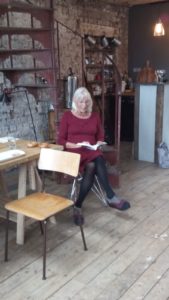
Do you feel as Donal Shaun Hercule Poseidon put it? “That’s all?” Donal asked. “Is there nothing more?”
Now when to read ‘news’ is to feel bathed in toxic sludge; when time is commonly cut into measly little parcels; when work makes you one with Donal: “It was as if the whole of his insides were writhing in an unnatural manner, and he often felt as if he was choking…He wanted only to fling back his chair, leave the building and run forever.” Meetings have made some contemplate murder; bullying cowards take up all the air; when fear of the other, the unknown, fear of a new thought is being stoked to the ambience of hell; the beauty of life outside ourselves is not considered worth contemplating; contemplation isn’t considered worth contemplating. In Oothangbart where Donal lives, even the wonderful and new is viewed with the alarm of Chicken Little. If you feel poisoned by all this even though you don’t live where Donal does, in a town as impossible to spell as Poughkeepsie (Oothangbart is also renowned in every citizen’s greeting for its perfection and exceptionalism), now there is no better antidote than a little unassuming book published last year–a book that not only identifies but crucially, frees.
Simply but powerfully written in a wholly natural style, but one with so many parts I want to read again that my physical copy bristles with pink slips (like all Steve Aylett’s books, which are rife with perfectly put, often tragically funny aphorisms about modern society), no reader of t Oothangbart should be embarrassed to admit that what happened to me, does to you. When I finished the last page, my cheeks were literally wet with joy. This book is not just about society but friendship, love, revolution: kites, not flags, oh my!
Oothangbart, a Subversive Fable for Adults and Bears by Rebecca Lloyd is a mess of a title. Who can remember that? But soon, enough, subversion insidiates, for this story is our very lives: a complex metaphor for so many parts of society, from the social escalator of success for the successful, to the fear and aversion to the different and foreign that I’ve had a hard time writing anything about it, for the thought “That’s positively Oothangbartian” has hit me constantly since finishing it, and I’ve been tempted to share these parallels. Not that you need them. What you do need is the honest reassurance that Lloyd’s chapter 2 title: A PERVERSE THOUGHT fits the book as perfectly as a drug label round a bottle.
Some of it is even so damn true but unadmitted, it’s explosively funny. True bagels (yes, there be bagels here as well as bears), not the ubiquitous ‘bagels’ like those blueberry fluffies in the vending machine at the Seoul airport, are well and truly heavy as stones, and quite as indigestible. But the things people, uh, bears, do for love…
It’s perverse, brave, stirring, as perfectly pitched to the ridiculously real as the Academy of Projectors in Lagado that Gulliver reported; or Nobel-laureate Sydney Brenner’s advice in his collection of essays,
Loose Ends in Biology: “I have personally found it extremely useful, when dealing with managers, to invert all the catch phrases and exhortations.”
Oh, hell. This gem is so “Positively Oothangbartian” I’m not strong enough to leave it out. “There are people getting degrees in biological sciences at the best universities in America today who don’t know the names of anything outdoors, who have never studied anything but a cell.” — Jonathan Foley, exec director, California Academy of Sciences (“The Meaning of Lichen” by Erica Gies, Scientific American, June 2017)
The smallmindedness that reigns supreme now in too many places is torn to shreds and fed to the fishes in this glorious novel. And though I said I wouldn’t, I must give this example of the way this book is like
a spiderweb, its triplines reaching out in all directions:
From the 27/6/2017 PBS Newshour interview of Jason Isbell, singer-songwriter and guitarist–“A lot of people that I grew up with, went to school with in Alabama, and a lot of people in my family who told me growing up that cities were terrible places and anything outside of our little circle was scary and dangerous and frightening. And I thought about the effect that had on people, when you start to believe that, and you let yourself be so afraid of other people and the outside world, that you never feel tethered, you never feel a connection with the rest of humanity. So, I wrote that song based on that kind of fear.”
Rebecca Lloyd’s timeless OOTHANGBART sings, too. Read it, give it, read it to someone you love in the small time you snatch between… or as Lloyd writes in the Afterword “This book is for people who hate the typical work hierarchy that if drawn as a symbol looks like a pointed white-faced clown hat without the bobbles, and it is for …” But Lloyd is wrong to limit. Oothangbart, just as freedom, is for everyone.
…Anna Tambour, 2013 World Fantasy Award nominee for the novel ‘Crandolin.’



